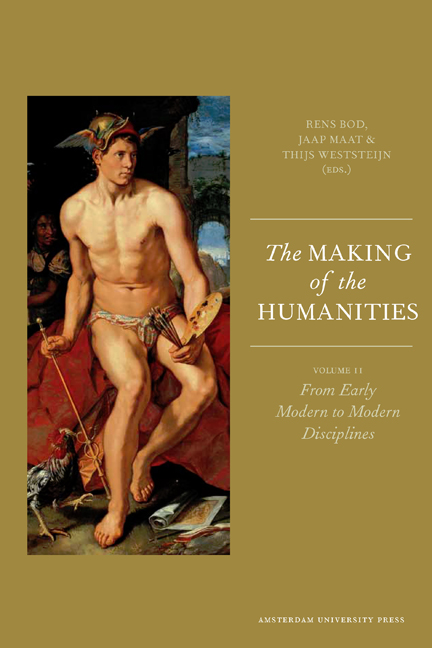Book contents
- Frontmatter
- Contents
- Introduction: The Dawn of the Modern Humanities
- I Linguistics and Philology
- II The Humanities and the Sciences
- III Writing History and Intellectual History
- IV The Impact of the East
- V Artworks and Texts
- VI Literature and Rhetoric
- VII Academic Communities
- Contributors
- List of Figures
- Index
Humboldt in Copenhagen: Discipline Formation in the Humanities at the University of Copenhagen in the Nineteenth Century
Published online by Cambridge University Press: 19 January 2021
- Frontmatter
- Contents
- Introduction: The Dawn of the Modern Humanities
- I Linguistics and Philology
- II The Humanities and the Sciences
- III Writing History and Intellectual History
- IV The Impact of the East
- V Artworks and Texts
- VI Literature and Rhetoric
- VII Academic Communities
- Contributors
- List of Figures
- Index
Summary
Wilhelm von Humboldt never went to Copenhagen. Not in a physical sense, anyway. But the ideas connected to his name did, the amalgam of idealist philosophy of German thinkers such as Kant, Schleiermacher, Schiller and Fichte who formulated the ideal of ‘Synthese zwischen Bildung und Wissenschaft, Synthese aus Forschung und Lehre, Synthese der Disziplinen.’ The idea of a university embedded in this thinking had scholarship (Wissenschaft) as the key concept. The aim of scholarship was to create knowledge for no other purpose than knowledge itself. Scholarship was to be the cornerstone of the university and the primary and defining pursuit of academic practice. A concomitant emphasis was put on research as the core of scholarship and scholarly activities. Scholarship was primary to teaching and teaching was dependent on it; in this sense there was a unity of research and teaching. The outcome of teaching was Bildung, another central concept of the ‘Humboldt model’ and the New Humanism on which it drew. Bildung was something essentially individualistic, self-motivated and non-utilitarian. Neither research, nor teaching, nor study should be limited by external concerns or constraints. Freedom should prevail for the scholar and the student; their only guidance should be their interest in gaining knowledge. This freedom would have to be secured by the state. A final aspect was the unity of knowledge. The idea of unity of knowledge points to a general tendency of the organicism on which this thinking was founded. Wholeness and unity was perceived as positive, partition and fragmentation was seen as negative.
It was these ideas that ‘went to Copenhagen’ at the beginning of the nineteenth century. The subject of this essay is the fate of the ‘Humboldt model’ in the context of the humanities at the University of Copenhagen in the course of the nineteenth century. I will focus on two aspects. The first aspect is discipline formation, and here I will focus on Classical Philology, National Philology, History and the Modern Philologies. The second aspect is the institutionalization of the research imperative, specialized scholarship and professionalization of scholarly work.
- Type
- Chapter
- Information
- The Making of the HumanitiesVolume II: From Early Modern to Modern Disciplines, pp. 377 - 396Publisher: Amsterdam University PressPrint publication year: 2012



